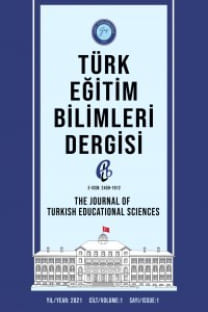ALTINCI SINIF ÖĞRENCİLERİNİN KİŞİLER ARASI PROBLEM ÇÖZME BECERİ ALGILARI
Bu araştırmada, ilköğretim okulu altıncı sınıf öğrencilerinin sosyo-ekonomik düzey, ana-baba tutumu, cinsiyet ve kardeş sayılarına göre kişiler arası problem çözme beceri algıları incelenmiştir. Araştırmanın örneklemini 101 kız, 93 erkek toplam 194 öğrenci oluşturmuştur. Araştırmada öğrencilerin kişiler arası problem çözme beceri algıları “Kişiler arası Problem Çözme Becerileri Yüksek Kişilerin Özellikleri Ölçeği” ile, ana-baba tutumları “Ana-Baba Tutum Ölçeği” ile ve kişisel niteliklere ilişkin bilgiler ise “Sosyo-Ekonomik Düzey Ölçeği” ile elde edilmiştir. Araştırmada elde edilen verilerin istatistiksel analizlerinde t testi, tek yönlü varyans analizi ve Scheffe - Testi kullanılmıştır. Araştırma sonuçları, öğrencilerin kişiler arası problem çözme beceri algılarının ana-baba tutumlarına ve sosyo-ekonomik düzeylerine göre farklılık gösterdiğini; cinsiyetlerine ve kardeş sayılarına göre farklılık göstermediğini ortaya koymuştur.
Anahtar Kelimeler:
Problem, problem çözme, kişiler arası problem çözme
THE INTERPERSONAL PROBLEM-SOLVING SKILLS PERCEPTION OF THE 6th GRADE PUPILS
In this study the perceptual interpersonal problem solving skills of 6th grade students were examined in terms of sex, socio-economic status, parental attitudes, and number of siblings. The sample of the study consisted of totaly 194 students as 101 female, and 93 male. The data about perceptual interpersonal problem solving skills were gathered by the #Scale of Characteristics of People Who Are High At Interpersonal Problem Solving Skillsg; the data about parental attitudes were gathered by #Parental Attitudes Scaleg; and the data about personal traits were collected by the #Socio-economic Status Scaleg. In the analysis of the data t-test, one-way analysis of variance, and Scheffe Test were employed. The result of this study indicated that perceptual interpersonal problem solving skills of the students differed in terms of the attitudes of the student∞s parents, and socio-economic status of the students; however perceptual interpersonal problem solving skills of the students did not differ in terms of gender and number of siblings.
Keywords:
Problem, problem solving, interpersonal problem solving,
- Başlangıç: 2003
- Yayıncı: ANKARA HACI BAYRAM VELİ ÜNİVERSİTESİ
Sayıdaki Diğer Makaleler
FİZİK ÖĞRETİMİ UYGULAMALARINDA KARŞILAŞILAN GÜÇLÜKLER
Ali Rıza AKDENİZ, Orhan KARAMUSTAFAOĞLU
İLKÖĞRETİM OKULLARINDA GÖREV YAPAN YÖNETİCİ VE ÖĞRETMENLERİN ÖĞRENEN ORGANİZASYONA İLİŞKİN ALGILARI
İŞGÖRENLERİN ÖRGÜTE UYUMU (ÖRGÜTSEL SOSYALİZASYON)
TÜRK MİLLÎ EĞİTİMİNDEN FELSEFÎ BİR KESİT
Fizik Öğretimi Uygulamalarında Karşılaşılan Güçlükler
Ali Rıza AKDENİZ, Orhan KARAMUSTAFAOĞLU
MÜLKİYELİ BİR EĞİTİM BİLİMCİ: İHSAN SUNGU
ALTINCI SINIF ÖĞRENCİLERİNİN KİŞİLER ARASI PROBLEM ÇÖZME BECERİ ALGILARI
